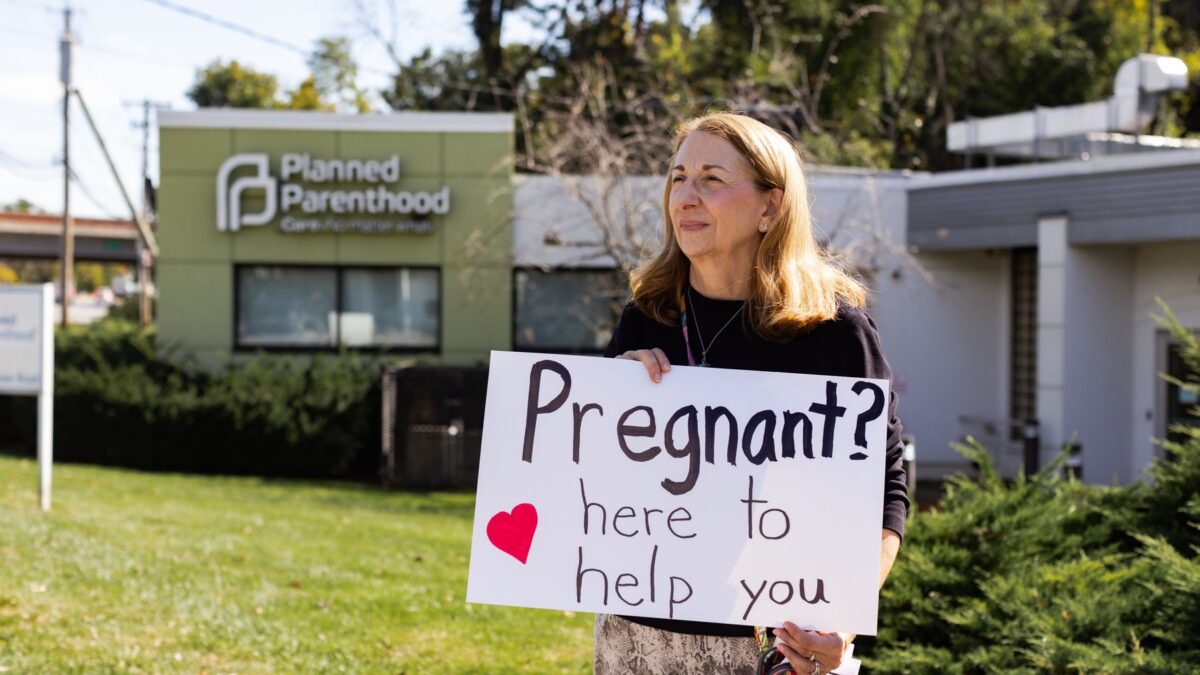Despite repeated, and disturbingly vindictive, attempts by the government to muzzle Christians in America, this Supreme Court has consistently vindicated the First Amendment. Now it has the chance to do so yet again.
Debra Vitagliano, a Catholic woman from Westchester County, New York, has been barred from counseling pregnant women outside abortion facilities. That level of speech repression sounds more typical of authoritarian societies, but fortunately, during their conference this Friday, the court is set to vote on taking up her case. As a bonus, the court has a chance to continue undoing the decades-old legal cover provided for the abortion industry by public officials.
After the Supreme Court’s decision in Dobbs v. Jackson Women’s Health Organization overruled Roe v. Wade, Westchester County passed an ordinance restricting free speech around abortion facilities. It established a 100-foot zone around them and prohibited anyone from approaching within eight feet of a person in that zone to provide information or counseling unless given express consent.
Before this law was passed, Vitagliano had participated in a prayer vigil at the Planned Parenthood in White Plains, New York, where she prayed peacefully and held signs about the effects of abortion on both expecting mothers and fathers. She trained to serve as a volunteer “sidewalk counselor,” discussing life-affirming alternatives to pregnant women contemplating abortion. But she has been unable to put her training into action because, under the county law, if she approaches a woman to speak about alternatives to abortion, she could be criminally punished.
Vitagliano went to court, asserting that her free-speech rights had been violated by the county law. Unfortunately, she faces an obstacle in the shape of Hill v. Colorado, a 2000 Supreme Court decision. The court in Hill rejected a request by pro-life activists to overturn a Colorado law that is almost identical to Westchester County’s.
“The fact that the messages conveyed by those communications may be offensive to their recipients does not deprive them of constitutional protection,” wrote Justice John Paul Stevens for the majority. “On the other hand,” Stevens continued, states may exercise police powers “to protect the health and safety of their citizens” and that interest may “justify a special focus on unimpeded access to health care facilities and the avoidance of potential trauma to patients associated with confrontational protests.”
That confusing opinion was sadly typical of the late Justice Stevens, who started in the court’s ideological center but drifted haphazardly to the left as he got older. By contrast, the late Justice Antonin Scalia, in a scathing dissent joined by Justice Clarence Thomas, saw things clearly.
“What is before us, after all, is a speech regulation directed against the opponents of abortion, and it therefore enjoys the benefit of the ‘ad hoc nullification machine’ that the Court has set in motion to push aside whatever doctrines of constitutional law stand in the way of that highly favored practice,” Scalia wrote.
Clearly exasperated, he added, “Having deprived abortion opponents of the political right to persuade the electorate that abortion should be restricted by law, the Court today continues and expands its assault upon their individual right to persuade women contemplating abortion that what they are doing is wrong.”
Scalia was right to denounce the mantle of legal protection given by the court to the abortion industry at the time Hill was decided. Thankfully, things are changing. Dobbs was an indispensable first step to restoring our constitutional order. But more needs to be done. Overturning Hill is a great place to start.
Although Vitagliano’s request for review is grounded in her right to free speech, the court need not ignore her religious convictions in support of life. This is such an important point. The petition for review to the court explains, “Consistent with her Catholic faith, [Vitagliano] opposes abortion, believing it is the deliberate taking of innocent human life.”
Vitagliano is not alone in feeling drawn by her Catholic faith to stand up for pregnant women and their unborn children. Earlier this month, the United States Conference of Catholic Bishops (USCCB) reiterated that opposing abortion is the “preeminent priority” for the bishops’ conference, a decision that drove leaders of the American Church’s progressive faction wild with indignation. A guide the USCCB plans to disseminate to Catholic voters before the 2024 election explains that abortion, “directly attacks our most vulnerable and voiceless brothers and sisters and destroys more than a million lives per year in our country alone.”
Religious motivation for speaking, or refusing to engage in “compelled speech,” has also animated recent cases in which the court vindicated the free-speech guarantee. In upholding the right of a high school football coach to pray on the field after games, the court observed that the “Free Speech Clause provides overlapping protection for expressive religious activities. That the First Amendment doubly protects religious speech is no accident. It is a natural outgrowth of the framers’ distrust of government attempts to regulate religion and suppress dissent.”
Vitagliano’s lawyers at Becket Law understand the special protection the founders believed should be afforded religious expression. Becket’s amicus brief filed with the court earlier this year in 303 Creative v. Elenis, a free-speech case involving a Christian wedding website designer, explained that “freedom of speech first emerged within the Anglo-American tradition as freedom of religious speech, and religious speech has retained that special role within speech jurisprudence ever since. Today, that history means that religious speech, like political speech, is core speech that cannot be burdened without proper justification.”
As our nation heals from the injury to our body politic wrought by abortion, people like Debra Vitagliano are crucial. They are reaching out to pregnant women (and expectant fathers) to show that there are alternatives to abortion. And many are doing so out of sincere religious convictions. It’s time for the Supreme Court to stop the government from trying to silence them.









